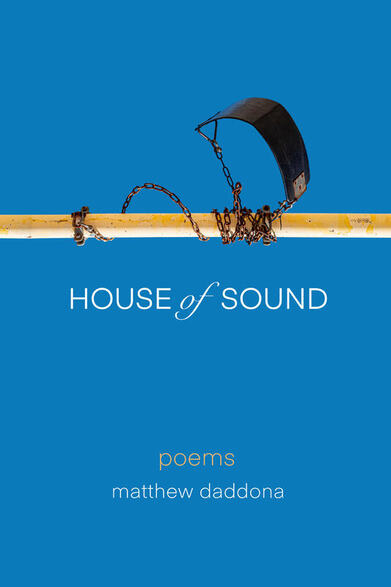House of Sound: Poetry by Matthew Daddona

Academy of American Poets prize-winning poet Matthew Daddona's debut collection, House of Sound, is a rumination on domesticity and modern-living, a playful and earnest attempt to discover truth within silence and hope within noise.
In these twenty-eight poems, Daddona combines narrative and lyricism to recreate a home-and thus, a mode of living-that delivers to us a family searching for contact amid society's cacophony. In "Poem for Leaving," a narrator attempts to put together a former friend's reason for deserting him for a more alluring country, while in "Tourist Trap," a husband reckons with trying to protect his wife from verbal and physical assault while pondering the language of violence and appeasement. As the roles of mother, father, sister, brother, daughter, son, are often exchanged, borrowed, interplayed, the collection externalizes their choices by showing the narrator take flight from his hometown in the conclusive "Poem for Returning." Celebrating language, and ultimately the liberty of choice, Daddona writes, "To become love, / dress in idiom."
House of Sound is a dynamic and dexterous debut from a bold new writer, a commentary upon the joys and defeats of trying to live most beautifully.
“I can’t remember where I heard it but I heard someone say, when referring to the music of Miles Davis, that he played the ‘sound of jazz.’ When I read Matthew Daddona's book of poems, House of Sound, I have to say, ‘The poetry of Matthew Daddona is the sound of poetry.’ It is. Daddona’s poems are sonically and visually brilliant. I mean brilliant, twofold. One, they light up the world. Two, they exist in a domain of magical surprise. There are the little moments of lyrical beacons like, ‘The roof is aflutter. / Michael calls / Starlings, Darlings,’ and then there are the large heart monasteries like, ‘I know this: sound can make / a heart break like glass / and that there are two sounds / for every / one heart.’ That is what this book is, a heart monastery, and each poem has at least two sounds for its one big heart. Within the sound of his poems there is a silence, and in this silence, there is a world of image and light, big light, that sweeps across the landscape of human experience and implores you to listen. When you read House of Sound, listen aflutter. Read these poems to yourself. Read them out loud to yourself and then quietly to your beloved. Be beloved with these poems so you can be beloved with the world.”
—Matthew Lippman, author of Mesmerizingly Sadly Beautiful
In these twenty-eight poems, Daddona combines narrative and lyricism to recreate a home-and thus, a mode of living-that delivers to us a family searching for contact amid society's cacophony. In "Poem for Leaving," a narrator attempts to put together a former friend's reason for deserting him for a more alluring country, while in "Tourist Trap," a husband reckons with trying to protect his wife from verbal and physical assault while pondering the language of violence and appeasement. As the roles of mother, father, sister, brother, daughter, son, are often exchanged, borrowed, interplayed, the collection externalizes their choices by showing the narrator take flight from his hometown in the conclusive "Poem for Returning." Celebrating language, and ultimately the liberty of choice, Daddona writes, "To become love, / dress in idiom."
House of Sound is a dynamic and dexterous debut from a bold new writer, a commentary upon the joys and defeats of trying to live most beautifully.
“I can’t remember where I heard it but I heard someone say, when referring to the music of Miles Davis, that he played the ‘sound of jazz.’ When I read Matthew Daddona's book of poems, House of Sound, I have to say, ‘The poetry of Matthew Daddona is the sound of poetry.’ It is. Daddona’s poems are sonically and visually brilliant. I mean brilliant, twofold. One, they light up the world. Two, they exist in a domain of magical surprise. There are the little moments of lyrical beacons like, ‘The roof is aflutter. / Michael calls / Starlings, Darlings,’ and then there are the large heart monasteries like, ‘I know this: sound can make / a heart break like glass / and that there are two sounds / for every / one heart.’ That is what this book is, a heart monastery, and each poem has at least two sounds for its one big heart. Within the sound of his poems there is a silence, and in this silence, there is a world of image and light, big light, that sweeps across the landscape of human experience and implores you to listen. When you read House of Sound, listen aflutter. Read these poems to yourself. Read them out loud to yourself and then quietly to your beloved. Be beloved with these poems so you can be beloved with the world.”
—Matthew Lippman, author of Mesmerizingly Sadly Beautiful
Order House of Sound
About Matthew Daddona

Matthew Daddona is the author of the poetry collection of House of Sound, which Publishers Weekly called “ruminative...a glimpse into a mind on the search for answers,” and his debut novel, The Longitude of Grief. A multi-hyphenate writer, his work has appeared in dozens of publications, including The New York Times, Newsday, Electric Literature, Whalebone, Tin House, and McSweeney's Internet Tendency. He lives on the North Fork of Long Island, where, in addition to writing, he shucks oysters, installs irrigation systems, and volunteers as a firefighter.